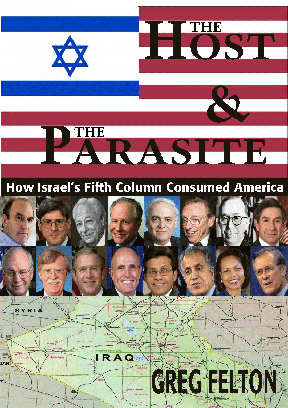March 22, 2007 The Globe and Mail was guilty. The evidence said it was guilty. So what happened to the men and women of the Ontario Press Council impaneled to evaluate the charge of plagiarism? Well, they decided to ignore the evidence and allow Globe representative Patrick Martin to pollute the hearing with irrelevant arguments and casuistic digressions. The judgment handed down on March 14 reflected these digressions, and so was marginally less inane than editor-in-chief Eddie Greenspon’s non-cognitive retort to me when I brought up this same evidence in March 2006. Those of you who have followed this case know what happened. On Feb. 15, 2006, Marcus Gee wrote a defamatory editorial against the newly elected government of Palestine based on propaganda from Palestinian Media Watch, a zionist website infamous for publishing distorted and fabricated information designed to demonize Arabs. Gee lifted the propaganda whole cloth from PMW never bothering to check its accuracy (!) or even citing it as a source, unlike the Jerusalem Post, which did cite it. Deliberately passing off another person’s work as one’s own is the very essence of plagiarism, and this fact formed the basis of the complaint brought by CAPCA (Coalition of Arab Canadian Professionals and Community Associations) and CJPME (Canadians for Justice and Peace in the Middle East).
“The Ontario Press Council is of the view that when the editorial was published The Globe and Mail did not have the information which it subsequently acquired to identify the site as the Hamas site. It does believe that in saying the video was ‘presented on the Hamas website this week’ and that ‘Hamas is airing it now,’ the editorial left the impression that it had just been posted when, in fact, there was no indication how long it had been on the site. But with the reservation, it dismisses the complaint.” First, the council rightly recognizes that the Globe did not check its source. Next, the council passes over this fact to quibble about the authenticity of a Hamas website. Having managed to duck the issue safely, the council dismisses the complaint “with the reservation.” What the hell does this mean?! I called the council’s executive secretary Mel Sufrin for clarification but just got more bafflegab: “The editorial just reported what was on the website. It was the council’s decision that there was no plagiarism.” Leaving aside the absurdity of this statement, Gee’s editorial violated four canons of the council’s own Editorial Writers Code of Conduct, (see sidebar), yet no mention of these violations appears anywhere in the judgment. Beyond the obvious violation of injunctions against fraud and misleading the paper’s readers, the fourth one deserves special mention:
Such unethical reprehensible conduct formed the basis of the CAPCA/ CJPME charge of plagiarism yet it was expressly denied by council chairman Robert G. Elgie. In a later letter to Cam Robertson, who represented CJPME, Elgie claimed that the abovementioned injunction did not apply because “complainants themselves removed them from discussion during the hearing.” “Absolutely untrue!” said Robertson, a view corroborated by Samah Sabawi, who also represented CJPME. Moreover, Elgie went on to state that the conclusions of the editorial were those of the writer (Gee), but this statement is also false. Because he lifted the information without attribution directly from an outside writing service and presented this information as his own, Gee’s role was that of a parrot, not a journalist who could draw his own conclusions. Even if we grant that Gee actually “wrote” the editorial, the paper was obliged to repudiate it—or at least issue a correction—as soon as it discovered that the editorial communicated false information. Since the Globe has never corrected the consequential errors of putting the men in the video in a false light, nor has it offered any apology, Elgie’s attempt to exculpate the paper must be dismissed a feeble cover up. Whether the video clip came from an official Hamas website or not is beside the point. CAPCA president Bahija Réghaï said the complainants bore some responsibility for the poor judgment because they allowed Martin to seize control of the discussion and steer it in a direction favourable to the Globe. The burden of proof about the website’s connection to Hamas, to the extent that it had any relevance, lay with the Globe since Gee asserted that it was a Hamas site and made no apologies about taking PMW’s word for it. In a tactical error, the complainants got ensnared in this digression and helped Martin to ignore the larger question of plagiarism. To his credit, Réghaï said Martin argued the paper’s case well, even though he may not have believed in it. Despite the judgment, Réghaï said a lot of good came out of the hearing. Although CJPME worked with CAPCA on the complaint, it is less willing to look on the bright side. In a March 15 press release, Robertson announced that CJPME would appeal the decision to the entire council. The basis for the appeal lies in the council’s refusal to enforce its own ethical standards and willful ignorance of plagiarism. The editorial alleged that the two people shown in the video, which Gee never saw, were suicide bombers. They were not. They were resistance fighters who died in combat against Israel, said Robertson. As of this writing, 400 days have elapsed since the editorial came out, and to any intelligent observer, justice has not been done. It is fashionable, if not obligatory, to denounce Hamas as a terrorist group when in fact it is a legitimate political entity with considerably less blood on its hands than the zionist terrorists who control Occupied Palestine. Consequently, few are willing to be seen defending Hamas, even when it has been wronged, or are willing to punish those who commit the wrong. The Globe got off because a judgment in favour of the complainants would have shown PMW to be a zionist hate site and possibly lead to the termination of its activities in Canada. It also would have exposed Gee as an uncritical zionist shill, to say nothing of the Globe’s broad pro-Israel bias. In this regard, the last line of the fourth violated code of conduct bears repeating: “Failure to disclose the source of such editorials is unethical, and particularly reprehensible when the service is in the employ of a special interest.” At least one piece of really good news came out of this. I’ve been told that Gee was put on leave one month after the offending editorial appeared and has been sacked from the editorial board. I guess that counts as a victory.
|

